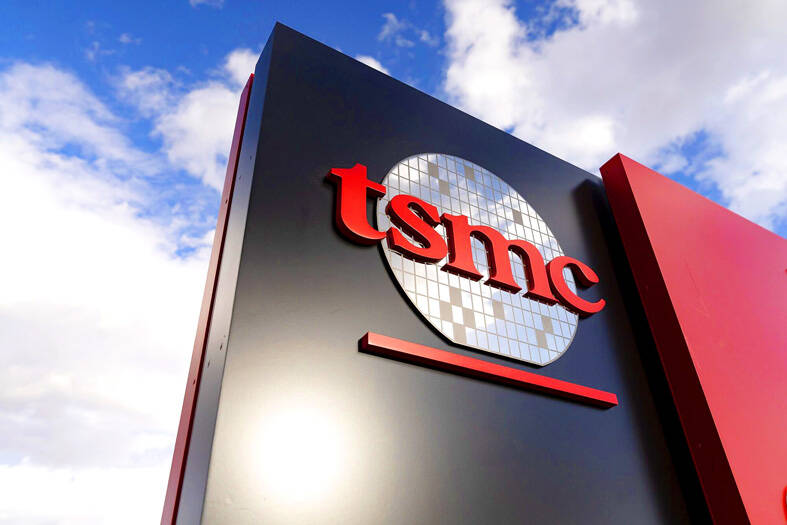Taiwan Semiconductor Manufacturing Co’s (TSMC, 台積電) revenue climbed 39.2 percent year-on-year in the first two months, quickening from last year in a sign of resilient demand for the Nvidia Corp chips that power artificial intelligence (AI) development.
The world’s largest chipmaker reported combined revenue for the first two months of NT$553.3 billion (US$16.81 billion). That compares with 34 percent growth for the whole of last year.
Last month alone, TSMC reported revenue of NT$260.01 billion, up 43.1 percent from a year earlier, but down 11.3 percent from a month earlier. Last month’s figure represented the company’s highest-ever sales for February.

Photo: Rebecca Noble, Bloomberg
Analysts said TSMC could still see its revenue increase to NT$266.7 billion or higher this month to achieve its first-quarter sales goal, which the company projected between NT$820 billion and NT$846.24 billion.
As the manufacturer of most of the AI chips in the world, TSMC’s sales are a barometer for the sector. Wall Street and Silicon Valley are now debating the sustainability of an AI frenzy that made Nvidia the world’s most valuable company, especially after China’s DeepSeek (深度求索) appeared to demonstrate a more frugal approach.
Last week, Broadcom Inc became the latest big tech firm to offer reassurance that spending on AI computing remains healthy. Before that, Taiwanese bellwether Hon Hai Precision Industry Co (鴻海精密) posted a 24.63 percent rise in revenue during the first two months of this year, also accelerating from last year.
A major uncertainty TSMC faces this year is whether US President Donald Trump would slap tariffs on chip imports. TSMC might have benefited from front-loading or stockpiling ahead of that potential move.
Last week, TSMC CEO C.C. Wei (魏哲家) joined Trump in the White House to outline an additional US$100 billion investment.
The move was widely viewed as intended to stave off tariffs, although it raised concerns that advanced technology could be moving away from Taiwan.
Additional reporting by CNA

In Italy’s storied gold-making hubs, jewelers are reworking their designs to trim gold content as they race to blunt the effect of record prices and appeal to shoppers watching their budgets. Gold prices hit a record high on Thursday, surging near US$5,600 an ounce, more than double a year ago as geopolitical concerns and jitters over trade pushed investors toward the safe-haven asset. The rally is putting undue pressure on small artisans as they face mounting demands from customers, including international brands, to produce cheaper items, from signature pieces to wedding rings, according to interviews with four independent jewelers in Italy’s main

Macronix International Co (旺宏), the world’s biggest NOR flash memory supplier, yesterday said it would spend NT$22 billion (US$699.1 million) on capacity expansion this year to increase its production of mid-to-low-density memory chips as the world’s major memorychip suppliers are phasing out the market. The company said its planned capital expenditures are about 11 times higher than the NT$1.8 billion it spent on new facilities and equipment last year. A majority of this year’s outlay would be allocated to step up capacity of multi-level cell (MLC) NAND flash memory chips, which are used in embedded multimedia cards (eMMC), a managed

Japanese Prime Minister Sanae Takaichi has talked up the benefits of a weaker yen in a campaign speech, adopting a tone at odds with her finance ministry, which has refused to rule out any options to counter excessive foreign exchange volatility. Takaichi later softened her stance, saying she did not have a preference for the yen’s direction. “People say the weak yen is bad right now, but for export industries, it’s a major opportunity,” Takaichi said on Saturday at a rally for Liberal Democratic Party candidate Daishiro Yamagiwa in Kanagawa Prefecture ahead of a snap election on Sunday. “Whether it’s selling food or

In the wake of strong global demand for AI applications, Taiwan’s export-oriented economy accelerated with the composite index of economic indicators flashing the first “red” light in December for one year, indicating the economy is in booming mode, the National Development Council (NDC) said yesterday. Moreover, the index of leading indicators, which gauges the potential state of the economy over the next six months, also moved higher in December amid growing optimism over the outlook, the NDC said. In December, the index of economic indicators rose one point from a month earlier to 38, at the lower end of the “red” light.